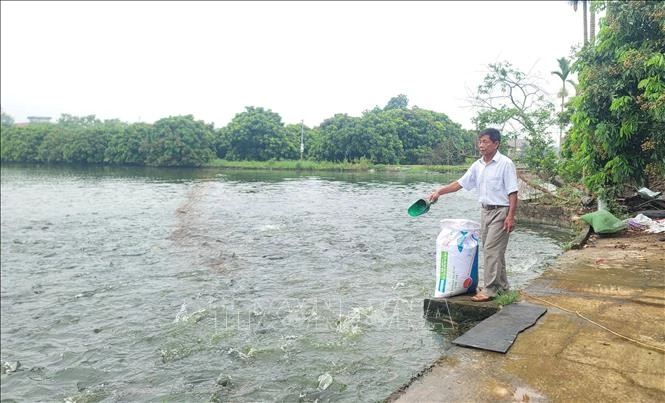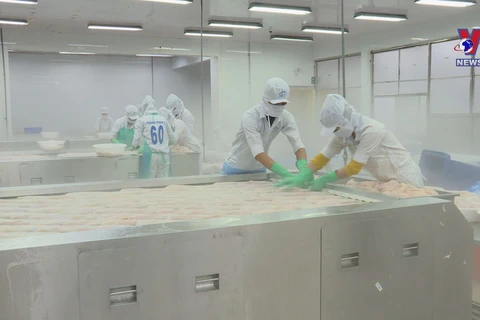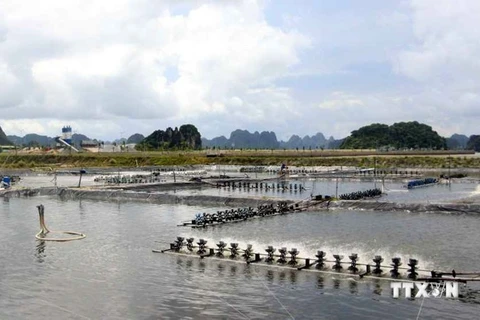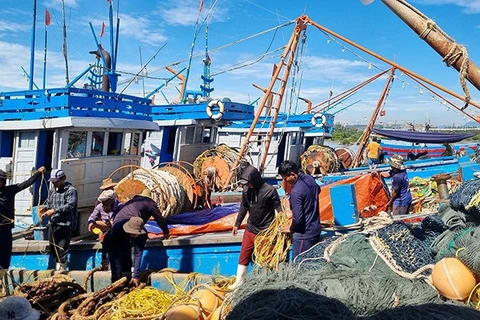
Hanoi (VNA) – Hanoi plans to develop fisheries into an important economic sector with large scale, high value and good brand, meeting local demand for freshwater aquatic products and export standards.
The capital city is home to 30,800ha of water surface, including about 24,200ha for aquaculture.
Some concentrated, high-tech, and intensive aquaculture zones have taken shape and generated high value in the districts of Ung Hoa, My Duc, Chuong My, Phu Xuyen, Ba Vi, Thanh Hoa, Thuong Tin, and Thanh Tri.
The aquaculture output stood at some 26,800 tonnes in the first quarter of 2024, up 4.3% from the same period last year, statistics show.
Experts said despite the water surface advantage, local aquaculture has yet to live up to potential.
They explained that water for aquaculture is mainly sourced from polluted rivers, animal feed prices surge while sales remain unstable. Infrastructure in concentrated aquaculture zones hasn’t been developed comprehensively, thus hampering high technology application.
Nguyen Dinh Dang, head of the sub-department for livestock production, fisheries and animal health at the municipal Department of Agriculture and Rural Development, said there are 25,800 households engaging in aquatic farming at present, but most of them are smallholders. The majority of products are mainly sold domestically and have modest value. Meanwhile, farmers’ knowledge about intensive and semi-intensive aquaculture and food safety remains limited.
Tu Duc Manh, head of the division for economic affairs of Thuong Tin district, said to tackle difficulties facing aquaculture zones, the district is encouraging farmers to apply scientific and technological advances such as in-pond raceway and biofloc technologies or the intensive farming of carp, grass carp, and tilapia.
Local authorities are combining programmes to provide support for locals to implement aquaculture projects, comply with VietGAP standards, and form connection chains to boost sales via modern distribution channels, Manh noted.
Nguyen Thi Tuyet Anh, head of the economic affairs division of Thanh Tri district, said Thanh Tri has coordinated with the city’s sub-department for livestock production, fisheries and animal health to organise annual training courses for farmers, frequently tested water to assess the environment quality in farming zones, and given guidance in farming techniques, disease prevention, and environment management to ensure biological and food safety.
Nguyen Manh Phuong, Deputy Director of the municipal Department of Agriculture and Rural Development, said that to develop aquaculture, the department has also worked with localities to open training courses about fry, feed, and environmental treatment products, conduct monitoring, and issue environmental warnings.
He added it will also enhance management of aquaculture, boost cooperation with other provinces and cities in the sale of aquatic products, expand aquaculture in poor-performing rice cultivation areas, and supply financial aid in environmental treatment for farmers in concentrated aquaculture zones.
Besides, Hanoi will build a plan on fisheries development by 2030, with a vision to 2045; reorganise production to raise productivity, quality, and value; and form industrial and high-tech farming zones. It targets that by 2030, the aquaculture area will reach 25,000ha, including 10,000ha of concentrated zones, with annual productivity of about 15 tonnes per ha.
At the same time with turning fisheries into an important economic sector, the city is set to ensure water drainage, prevent flooding, and reserve water resources, Phuong went on.
In particular, the city is promoting high-tech, organic, and ecological aquaculture programmes and models to bring down production costs, increase value, and boost sustainable development.
Infrastructure for concentrated aquaculture zones such as water supply and drainage systems, transport facilities, and environmental treatment systems will be further developed. A system of high-quality aquaculture breed production will also be built, with priority given to the species with high economic value and potential, according to the official./.






















